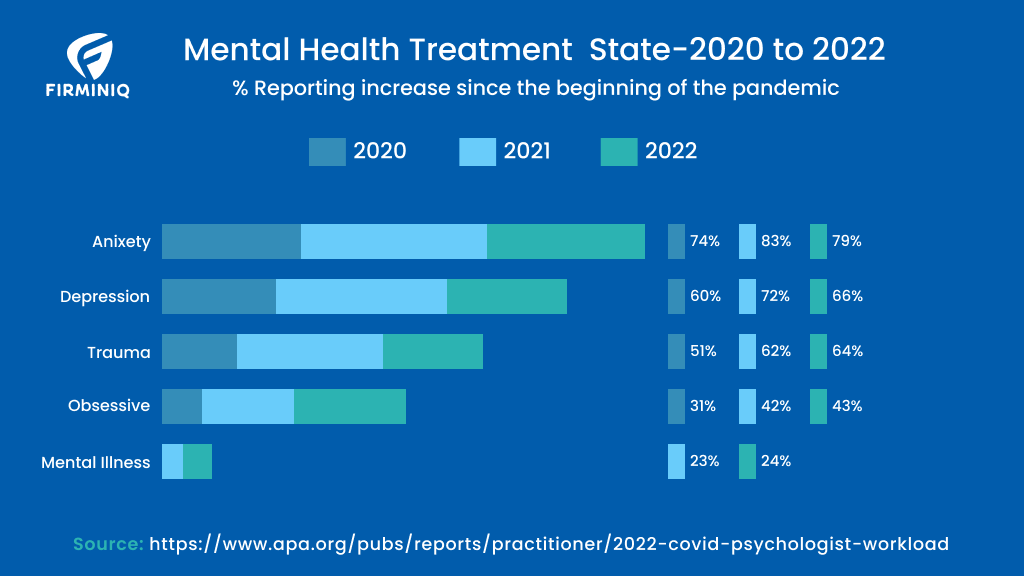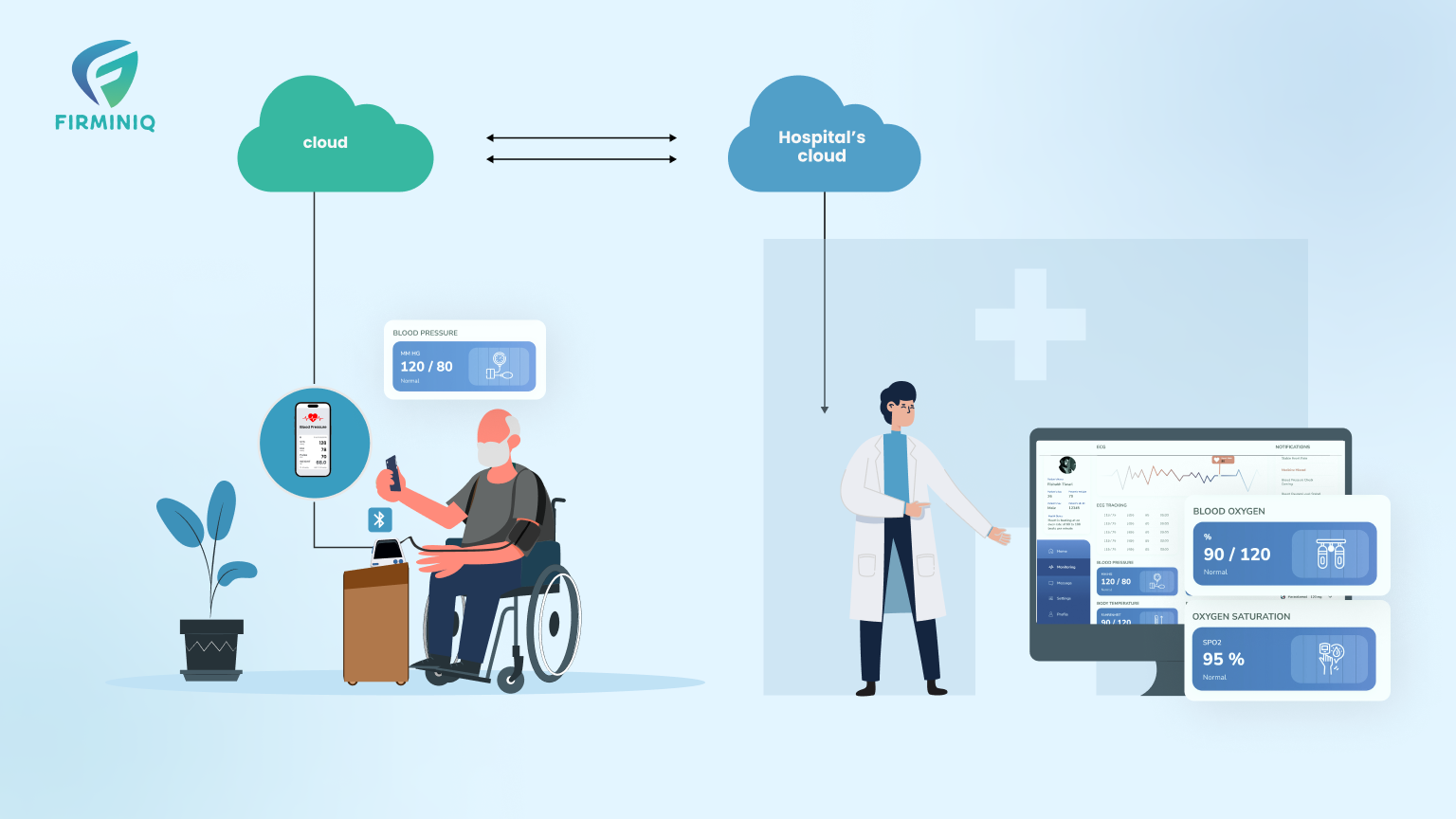Mental health is one of the most crucial components of overall well-being. One in three people suffer from long-term physical health conditions, also suffer from mental health problems, commonly depression or anxiety.
COVID-19 had a severe impact on the mental health of people as they experienced stress. From the frontline workers to school children, families, and individuals who lost their near ones, suffered from different mental conditions, and faced difficulties in accessing their mental health services. Due to the challenges in accessing mental health providers and isolation, achieving a balance between physical and mental health.
A study published in The Lancet Psychiatry found that healthcare workers involved in the care of COVID-19 patients had a high prevalence of PTSD symptoms.
Connected health solutions can offer a range of benefits for supporting mental wellbeing. Advanced technologies, telemedicine, and other services play a key role in supporting mental wellbeing. Not only does it allow seamless monitoring of patients, but also offers mental and social support for the patients, leading to their wellbeing. The blog covers all the aspects and ways in which connected health solutions help patients with mental conditions.
The Rising Demand for Mental Health
Three years into the COVID-19 pandemic, the demand for mental health services continues to increase while psychologists are struggling to provide needed care. These are among the key conclusions of APA’s 2022 COVID-19 Practitioner Impact Survey.
The percentage of psychologists reporting the patient increase in the anxiety, depressive or trauma related issues was high during 2022. The picture clearly depicts the three consecutive years report of changes in the treatment areas.

The disruption in mental health is closely related to disturbed physical health whereas good mental health positively affects physical health. Say for example, a person suffering from depression can lead to enhanced physical health issues including diabetes, heart strokes and others.
5 Ways in which Connected Health Supports Mental Well Being
With a higher potential to enhance mental well-being, connected health solutions offer real-time data and insights that offer support to individuals with ease of healthcare. Here are a few ways in which connected health solutions support mental well-being.
1. Remote Monitoring for Patients
Mental illness has turned to be one of the most usual, and has a physical, social, and monetary impact as well. When the pandemic stuck in March 2020, it fueled an alarming issue among the Americans, where they were left isolated and lonely.
Connected health devices, such as wearable fitness trackers and smart scales, can monitor health metrics such as heart rate, sleep patterns, and weight. This data can be used to track progress toward health goals and identify potential health issues before they become more serious.
For example, telehealth allows patients to receive mental health services remotely, so all those patients living in remote areas or having mobility issues can treat their mental conditions in a better way.
Not only does it offer great access to healthcare, but also reduces the stigma patients face due to such conditions. Connected health solutions make them more comfortable as they can seek help, maintain their privacy, and can engage in treatment with more convenience and accessibility.
2. Mental Health Support for the Patients
Mental illness is one of the most common concerns no matter what the age group is. As per a report from UNICEF, it is estimated that more than 13 per cent of adolescents globally live with a mental disorder. Connected health solutions can provide support for mental health issues, such as anxiety and depression.
The solutions offer many digital therapy programs and therapies that a user can avail at home, have a huge role in the management of the crisis, and have an enormous potential for scalability.
3. Social Support for Patients
Social support is yet another vital aspect of mental health treatment as it helps individuals cope with stress and other anxiety issues. Connected health solutions offer online counselling sessions, support groups, virtual therapy, helping patients offer a community and treat patients suffering from similar conditions. The solutions are quite helpful for introverted patients as they are not comfortable for face-to-face sessions, maintaining a healthy lifestyle.
Connected health solutions are one of the most valuable supplements that replaces the traditional patient treatment approach and streamlines care.
4. Telemedicine Support
Telemedicine support refers to the use of telecommunication and information technologies to provide healthcare services remotely. From medication management, consultation with the professionals to virtual therapy sessions, it offers an improved flexibility and support for the patients.
Examples of a few connected health solutions that offer telemedicine support for mental health include MDLive, Talkspace, Teladoc and others.
5. Data Privacy for Patients
Data management is the most critical concern in healthcare as it holds a significant amount of patient’s data and healthcare information. Patient data in the connected health solutions are stored securely using advanced security measures including firewalls, antivirus software, and access controls. The data is encrypted that ensures the data remains protected.
A Few Startups Working on Mental Health
1.Cerebral: A telemedicine company that offers online therapy and medication management for a range of mental health conditions. They also offer a wearable device called CerebralRX, which provides neurofeedback therapy to help users better manage anxiety, depression, and other conditions.
2.Talkspace: Talkspace is an online therapy platform that allows users to connect with licensed therapists through messaging, video, or voice calls. Users can choose from a variety of therapy plans that fit their needs and budget.
3.Woebot Health: Woebot is a chatbot that uses cognitive-behavioral therapy to help users manage their mental health. The chatbot provides personalized support and guidance to users through a conversational interface.
4.Ginger: Ginger is a platform that provides on-demand mental healthcare services. Users can access licensed therapists and psychiatrists through video or messaging sessions, and the platform offers mental health coaching and resources.
5.NeuroFlow: A digital health company that provides tools to improve mental wellness and outcomes. Their platform includes a wearable device that tracks and analyzes biometric data to personalize treatment plans.
Conclusion: Expansion of Connected Health Solutions for Patient’s Well Being
The expansion of connected health solutions for mental well-being allows patients to leverage more personalized and efficient care. Using such solutions helps patients better meet their needs and helps them cope with stress.
Are you a startup or entrepreneur helping patients with mental conditions? If yes, building a connected healthcare solution is a viable option. Reach out to us and know how we can help!






